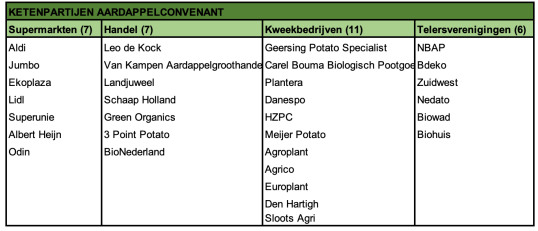On Friday, 31 Dutch chain parties signed a new deal in which they pledged to switch entirely to organic robust potato varieties. That means Bintje, Frieslander, and Agria will no longer be grown organically. Instead, seven supermarket chains will offer potato varieties that are resistant to Phytophthora.
That potato blight causes much damage in wet summers. Transitioning to hardy varieties protects growers from this financial risk. The new potatoes are not more expensive and, if this agreement leads to more stable yields, may even, eventually, be cheaper.
The supermarket chains committed to promoting and selling the robust potato varieties and want to offer only these potatoes in their organic assortments within five years. They also ask suppliers to choose the hardy varieties for processed potato products, like chips, French fries, and potato slices. too. Besides the retailers, seven supply companies, 11 breeding companies, and six grower associations signed on, too.

The robust varieties replacing the three varieties mentioned are less well-known but not of lesser quality. There are many hardy varieties available, so there are plenty of flavor, color, and texture choices.
Phytophthora ran rampant in 2016, and many organic growers' average yields fell from about 40 to 22 tons. That was a huge financial setback. Not transitioning to robust varieties means growers risk 30-50% yield reductions.
This complete transition is good news not only for organic farmers but for conventional ones too. Choosing these varieties means growers need to use 50% fewer crop protection products. Also, they no longer need to use copper - harmful to soil life - which was used to suppress Phytophthora.
"This step was long overdue. In recent years, the industry has been highly committed to developing resistant potato varieties, which is why we can now fully switch to robust cultivation. That also means it's now up to consumers. They can support growers by choosing organic potatoes," says Michaël Wilde, director of Bionext, the Dutch organic sector's trade association.
According to the Netherlands' Public Health and Environment Institute, people in that country eat an average of 72 grams of potatoes per day. That is about 26.3 kilograms per year, an annual total of roughly 454 million kg. Potatoes remain one of the most important Dutch arable crops. In 2020, there were 9,300 standard potato growers.
Of those, 262 were organic. The Netherlands has 163,500 hectares under potato crops, and 1.25% - some 2,054 hectares - is organic (Dutch Central Bureau of Statistics, 2020). That acreage is good for over 70,000 tons of organic potatoes, supplying 14% of the Dutch market.
Source: Bionext
